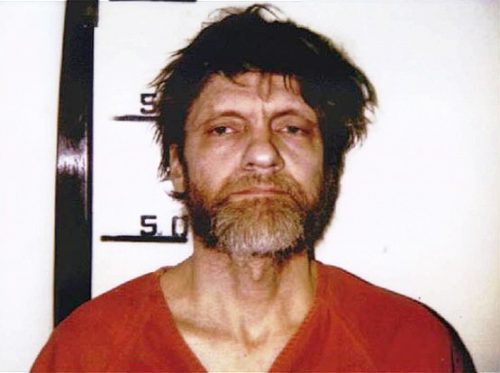Theodore “Ted” Kaczynski, nicknamed the “Unabomber,” killed and injured several people from 1978 to 1995 using mail bombs. Many experts on terrorism have difficulty in establishing whether to consider Ted a terrorist. Some believe he is simply a murderer, while others say that because of his political agenda and his decision to go after certain kinds of people, like science professors and big businessmen, that he should indeed be classified as a terrorist.1
Years before his bombing spree, in 1958, Kaczynski had been a student at Harvard University. The most astounding part is that he was only sixteen years old when he attended his first year as a freshman in college. As a child, Ted had been deemed a gifted student by his teachers. He reportedly had an IQ of 157 at the age of ten. He was allowed to skip sixth grade and work with older students, but he did not like that at all. In his journal, Ted described working with older students as considerably difficult, and he was regularly taunted by them. He never seemed to fit in. During high school, his struggle to be social continued, and he felt isolated from the rest of the students. Despite all of these problems, he still excelled academically and was allowed to skip the eleventh grade. He did have a moment of social fame which came when he made a pipe bomb in one of his science classes, but that moment of fame soon died away and he was alone again.2
During his time at Harvard, Ted continued to have extreme success academically, but still failed to be a part of the college’s social life. He lived in a single room, and some of his classmates recalled the room as messy, and that Kaczynski hardly had any interaction with any of his peers. At Harvard, he joined a study to determine the effects of extreme stress on the human psyche. The study had participants undergo extreme interrogations and personal belittlement over their beliefs and ideals. These interrogations upset Kaczynski, and he began to feel a disdain towards society and authority. According to Alston Chase, a Kaczynski researcher, Ted began to develop a theory to explain his anger and unhappiness. Chase said that, in Ted’s eyes, science and technology were destroying liberty and nature. The “system,” which included Harvard, sought to transform men into automatons to serve the machine by using techniques of behavior modification like propaganda and advertising. Unknowingly, during his undergraduate career, Ted was well on his way to becoming the Unabomber. He completed his undergraduate degree in mathematics in 1962, and went on to graduate school at the University of Michigan. He earned his master’s and Ph.D. in mathematics, and professors often described him as ambitious and talented.3
At that time, the University of California at Berkeley was considered the center of the counterculture movement, and that is where Ted decided to begin his career as a professor. He was uninterested in political activism, and failed, yet again, to become involved with those around him. He didn’t really have the talent to be a teacher and was very unpopular with students. So in January of 1969, he decided to resign his position at the end of the term. He also intended to give up mathematics altogether. His professional and social life began to spiral down after the decisions he had made.4

After his resignation, Kaczynski returned to Illinois, which was where he was born, and lived in a house owned by his parents. He was unemployed, and worked random jobs to get money, as well as borrowing money from his parents. Kaczynski was living as a hermit in the 1970s, and had little interaction with people as he began to sink deeper into his social isolation and anger. He directed all of that anger towards technology and its advancements in society. He began to write about the evils that came with technology and its control over individuals.5 During his time as a hermit, Ted decided to move to Montana where his brother lived. They split the cost of an open piece of land near Lincoln, Montana, and he began to construct a rudimentary cabin that measured 10 by 12 feet and lacked running water, electricity, and heat. Some of his neighbors described him as a quiet man who rode his homemade bicycle and spent a lot of time at the library. He enjoyed reading, and he acquired a substantial collection of volumes that filled his little home. As the decade progressed, he became more and more isolated from society. He returned to Illinois in 1978 and worked at a foam rubber factory where his brother was a supervisor. He was fired by his brother just a few weeks later, after posting insulting limericks around the factory because he had been rejected by a female plant manager. Many believe that this event was the tipping point that began his bombing campaign.6
Ted Kaczynski’s lengthy bombing campaign began on May 25, 1978, when he sent out his first bomb to Northwestern University. The box containing the bomb had a return address with the name of Professor Buckley Crist. The professor was suspicious of receiving a package that she never sent out and asked a campus officer to open it. The bomb detonated and caused the officer minor injuries. Ted then continued his campaign by attempting to bomb an airplane in November of 1979. The bomb detonated in the cargo hold and forced the place to land immediately. This attack sparked the start of a major investigation codenamed “Unabom” because of the university-based targets and the attack on a United Airlines executive.7

Throughout the span of seventeen years, the Unabomber seriously injured more than twenty-two people and killed three. One of the most notable deadly bombings was that of Gilbert Murray, a California timber-industry lobbyist. The package arrived on Monday, April 20. The first person to come in contact with the shoebox-size package was the receptionist who had trouble opening the package and carried it to her boss’ desk. At this point in Kaczynski’s bombing campaign, he had developed much more powerful and deadlier bombs that his previous ones. As Murray started to unwrap the package, it blew up in his hands. The blast killed Murray, forty-seven years old, and was so powerful it knocked two doors off their hinges and blew gashes into the ceiling panels. It was also loud enough that people heard it for blocks around. This startled and scared many people because the Oklahoma City bombing had occurred only five days earlier.8 It turns out that the bomb was never intended to kill Gilbert Murray but instead his predecessor, William Dennison. Dennison was the chief lobbyist for the forest-products trade group from 1980 to 1994 and a highly visible figure in a number of environmental issues. He was replaced by Murray who was killed by a package addressed to Dennison. At that time, William Dennison was seen as the No. 1 person in the timber industry because he was a prominent voice in the Pacific Northwest during the “the timber wars,” which involved environmentalists going up against ranchers, loggers, and the timber industry. Dennison was a key figure in the timber industry and many, including Ted, saw him as a threat to the environment, which could have been a reason why the Unabomber chose him, specifically.9

Around the time of the attack that killed Gilbert Murray, the Unabomber sent a letter to different newspapers, including the New York Times, that offered to stop his bombing spree if they published a manuscript titled “Industrial Society and Its Future,” which would later be known as the “Unabomber Manifesto.” If they did not comply, he threatened that the Freedom Club—”FC” was engraved on all his bombs—would ramp up their terrorist campaign. The manifesto ended up getting published by the Washington Post with help from Time Magazine on September 19, 1995. David Kaczynski, Ted’s brother, read the manifesto and recognized his brother’s writing style from reading unfinished copies that Ted had in his cabin. David contacted the authorities and Ted Kaczynski was arrested in April of 1996 in Montana. In his cabin, they found more than enough evidence, which included bomb-making supplies and early versions of the manifesto, to prove Kaczynski guilty. Two months later, he was charged with several criminal counts relating to the production and distribution of mail bombs. He resisted his lawyers’ efforts of declaring him insane and ended up not being able to represent himself in court. He agreed to a plea deal in 1998 to avoid going to trial. He pled guilty and was sentenced to life in prison without parole, and is still currently serving his sentence.10
- The Greenhaven Encyclopedia of Terrorism, 2007, s.v. “Unabomber, the (1942),” by Patricia D. Netzley. ↵
- Salem Press Encyclopedia of Science, 2013, s.v. “Unabomber case,” by Brion Sever. ↵
- Encyclopedia of World Biography, 2013, s.v. “Ted Kaczynski.” ↵
- Encyclopedia of World Biography, 2013, s.v. “Ted Kaczynski.” ↵
- Salem Press Encyclopedia of Science, 2013, s.v. “Unabomber case,” by Brion Sever. ↵
- Encyclopedia of World Biography, 2013, s.v. “Ted Kaczynski.” ↵
- Salem Press Encyclopedia of Science, 2014, s.v. “Unabomber” by Steve Hewitt. ↵
- Michael Lemonick and Jordan Bontante, “The bomb is in the mail,” Time, May 8, 1995, http://content.time.com/time/magazine/article/0,9171,982900,00.html. ↵
- Kenneth B. Noble, “Bombing in Sacramento: The Investigation; Bomb Meant for Predecessor Of Victim, Officials Say,” The New York Times, April 26, 1995, https://www.nytimes.com/1995/04/26/us/bombing-sacramento-investigation-bomb-meant-for-predecessor-victim-officials-say.html. ↵
- Encyclopedia of World Biography, 2013, s.v. “Ted Kaczynski.” ↵



111 comments
Eloisa Sanchez Urrea
This article did a really good job of showing the evolution of Ted Kaczynski from a Harvard student to a criminal. It was this evolution that really surprised me, because someone with such a promising future a criminal. This goes to show how complex our minds can be as well as how dangerous mental illness can be if they are left untreated.
Faten Al Shaibi
Ted Kaczynski , a person who is very smart and It is a pity to lose someone with such extraordinary intelligence, and do not take advantage of his talent and harness it to help people. On the contrary, his intelligence was the source of his misery .It is a sad story that he did not find someone to direct him to the right path and help him to be a better person and beneficial to his society.
Crystal Baeza
I find it interesting how some criminals usually grow up to be troubled at a young age and continue to spiral down then become criminals from their illegal acts but for Ted, that wasn’t the case. It’s insane how he had an IQ of 157 at the age of 10, skipped several grades, and be able to work with those much older than him then attend Harvard at the age of 16. If only people had treated him differently rather than judge him for his high intelligence then maybe Ted could have had a different ending.
Adrian Cook
Ted was a very smart man that again suffered from loneliness and other factors to effect his mind. We see it a lot in today’s age as many people who commit these acts are suffering from something. It’s crazy how all of this happened and how he was such a smart student in school. These bombings can be so simple but do tons of damage to a person. We should always be cautious of what we open because we may never know what’s inside. This was a very interesting article and have never heard of the “Unabomber”.
Robert Freise
It is crazy to think that somebody that was so intelligent at such a young age and had the chance to make a successful and peaceful life of himself. From what I understand, is that the setbacks in his life and constant state of being angered by technology ultimately got to him and caused him to turn to mass destruction on selected individuals. I am really surprised that Ted had no way to cope with his problems with technology. His isolation and lack of a social life really got him.
Daniela Duran
This was a very interesting article! I can’t believe that someone who could have had such a great future would end up like this! There is no doubt that Ted was actually a smart man, and perhaps all of the ways in which he was excluded from society were what ended up ruining his future. I can see from the article that he constantly followed a pattern, in which he got farther away from people every time. He just wanted to be lonely. Perhaps he did not feel welcome or he felt different to others, and this is what ended up developing emotions, such as anger, within him, and they later got out of his control. I am glad that he was caught in the end, because he could have been capable of hurting a lot more people. I really liked this article.
Rebecca Campos
This is one of the most common crime stories you hear, but the author really included a lot of details about the Unabomber and that I had never been informed of. I actually had never known where the title “The Unabomber” had come from, but now it makes perfect sense. It’s kind of sad that the life he lived was one of isolation and I’m sure it definitely did not positively contribute to his mental state. He was obviously a very intelligent individual because I don’t know any sixteen year olds in college. It’s just unfortunate that his life went the direction that it did.
Christopher Hohman
Nice article. The unabomber sounds like he was a disturbed guy. It is sad that his life started out with so much promise, but then he became a monster. I do not care what you believe in, whether it is technology is evil or whatever, that does not give you the right to start killing people. What I find fascinating is that they did not catch him until the 1990s. He was at large for quite awhile it seems. I am glad that his brother did the right thing and turned him in.
Lyzette Flores
I really liked how this article was written. I believe Ted was a very smart man obviously because he was already attending the University of Harvard at just the age of 16. That is something you don’t really hear often. He could have used his knowledge to do something bright but his feelings got the best of him. I feel as if he had good friends and was not bullied things would have been different. I strongly believe he could have been a completely different person.
William Rittenhouse
This is another perfect example of mental illness that went uncured and unanswered. It sounds like he was bullied because of his intelligence and had no help. I’m curious what his relationship with his parents was like. I’m assuming it wasn’t the greatest either. It’s also interesting how all his teachers described him as smart and ambitious. He valued education more than most things it seems like. Either way it was a terrible thing.